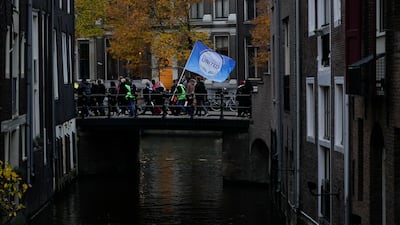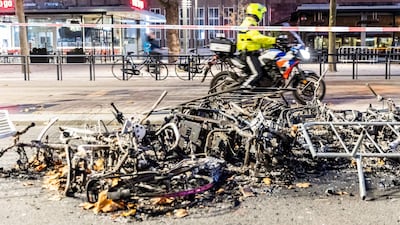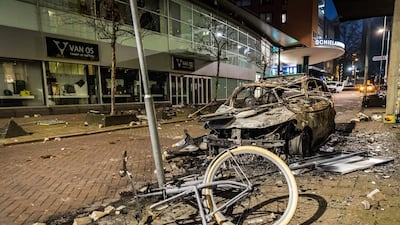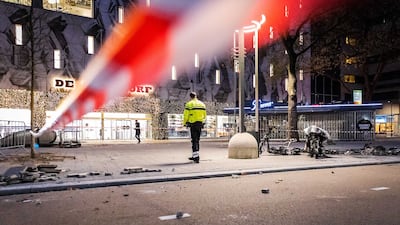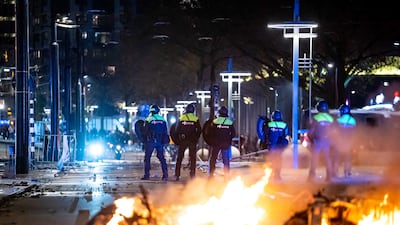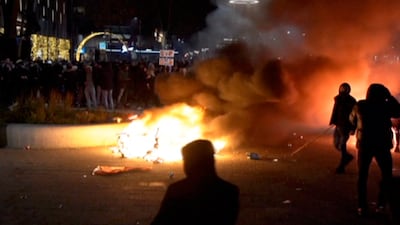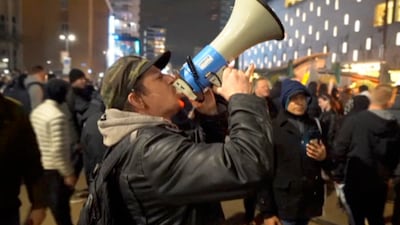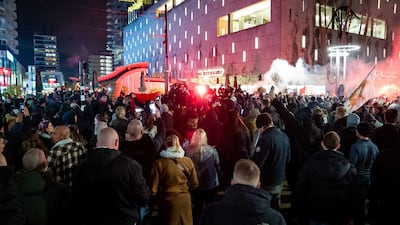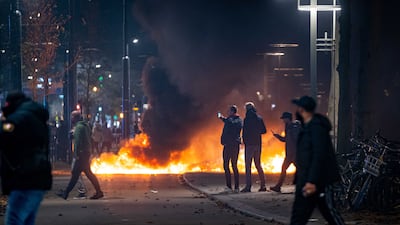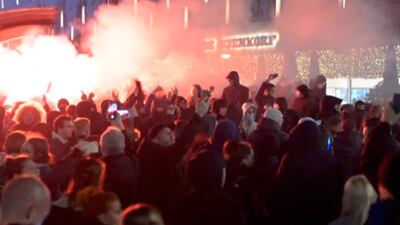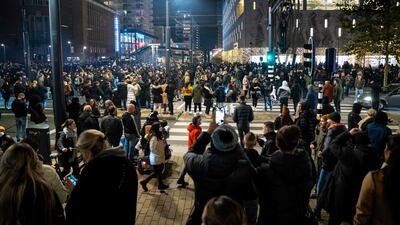Protests against coronavirus restrictions in the Netherlands turned violent for a second night as thousands more demonstrated peacefully across the country.
Violence also broke out earlier in the day in Vienna, the Austrian capital, where about 35,000 peole rallied. Demonstrators threw bottles at police, who fired pepper spray to disperse crowds.
In The Hague, fireworks and stones were thrown at police by a group of protesters. They set fire to at a pile of bicycles.
Officers in riot gear charged groups of protesters while mounted officers also patrolled the area. Police said in a tweet that seven people were arrested in The Hague and five officers were injured, one of them needing hospital treatment.
As Covid-19 spreads across Europe, a wave of anti-lockdown protests is also sweeping the continent.
Thousands marched in Croatia's capital Zagreb and in several cities in the Netherlands. Others rallies were held in Switzerland, Italy, Northern Ireland and North Macedonia.
Several thousand protesters gathered peacefully in Amsterdam. Another 1,000 people marched through the southern city of Breda near the Belgian border, carrying banners with slogans such as “No Lockdown".
In Austria, vehement protests erupted earlier on Saturday after the Alpine country ordered its fourth lockdown since the start of the coronavirus pandemic.
Thousands descended on the capital, Vienna, to protest against the three-week closure of most shops, restaurants, sporting venues and cultural institutions. A vaccine mandate planned for February will bar the unvaccinated from participating in various parts of public life.
Austria’s domestic intelligence service has warned that protesters may attempt to enter hospitals after calls for “action” in anti-vaccine social media groups.
Viennese police urged demonstrators to stay at home, warning that more than 1,300 officers would be on the streets.
Austria’s populist Freedom Party has been promoting Saturday’s rally for days. The demonstrations were planned after the government introduced measures targeted at the non-vaccinated — steps that have now been extended to all residents.
Austria’s daily Covid-19 cases have risen to record levels this month. Deaths, although not rising by as much, are the highest since last winter. Salzburg and Upper Austria currently have the highest seven-day Covid rate in Europe, according to the World Health Organisation.
Lothar Wieler, the head of the Germany’s public health institute, RKI, told the DPA newswire that contacts between citizens need to be rapidly reduced across the whole country to stem the surge of infections. He also called for vaccinations to be sped up.
About 68 per cent of Germans and 65 per cent of Austrians have been fully inoculated against Covid-19, below levels thought to create “herd immunity” from the virus.
They lag behind neighbours such as France and Italy, but vaccination levels in Eastern Europe are even far lower — from 59 per cent in the Czech Republic to 24 per cent in Bulgaria.
Pockets of unrest are spreading across Europe as governments return to strict measures such as lockdowns to reverse the latest coronavirus wave.
New infections are at record levels and some countries, including Germany, the Czech Republic and Greece, are clamping down on the unvaccinated as health services are pushed to the limit. Austria has gone further, with a nationwide lockdown to start Monday.
Violent demonstrations broke out in Rotterdam Friday night over the Netherlands’ virus restrictions. Police fired warning shots and broke up the crowd with a water cannon. At least seven injuries were reported.
Dutch lockdown protests turn violent — in pictures
The Dutch government has proposed excluding negative tests from the national health pass, allowing only vaccination or recovery from infection.
The state of Saxony in eastern Germany, one of the nation’s worst hit by the current wave of infections, announced tighter curbs on public life late on Friday. Christmas markets were cancelled and people who aren’t vaccinated face a curfew in hotspot areas. Bavaria has also set a mixture of lockdowns and curfews.
Hospitals and intensive care units in much of Europe are filling up, largely with the unvaccinated. German Chancellor Angela Merkel said on Thursday that the country faces a “dramatic situation”.
In Greece, almost nine out of every 10 patients in intensive care units are unvaccinated, Prime Minister Kyriakos Mitsotakis said in a nationally televised address. It is a pattern that has been repeated in recent months, from Italy to the US to Australia.
UK yet to take action
Yet with rest of Europe on Covid red alert, the UK government is still to take action, even on mask wearing which a global study released on Thursday found to be the most effective means of preventing viral transmission.
UK Prime Minister Boris Johnson warned on Monday that Christmas restrictions might be considered if the Covid wave on the continent lands on the UK's shores.
The “if” was at odds with the epidemiological reality: the UK has contended with daily infections regularly exceeding 30,000 since July, thousands higher than anywhere else in Europe.
